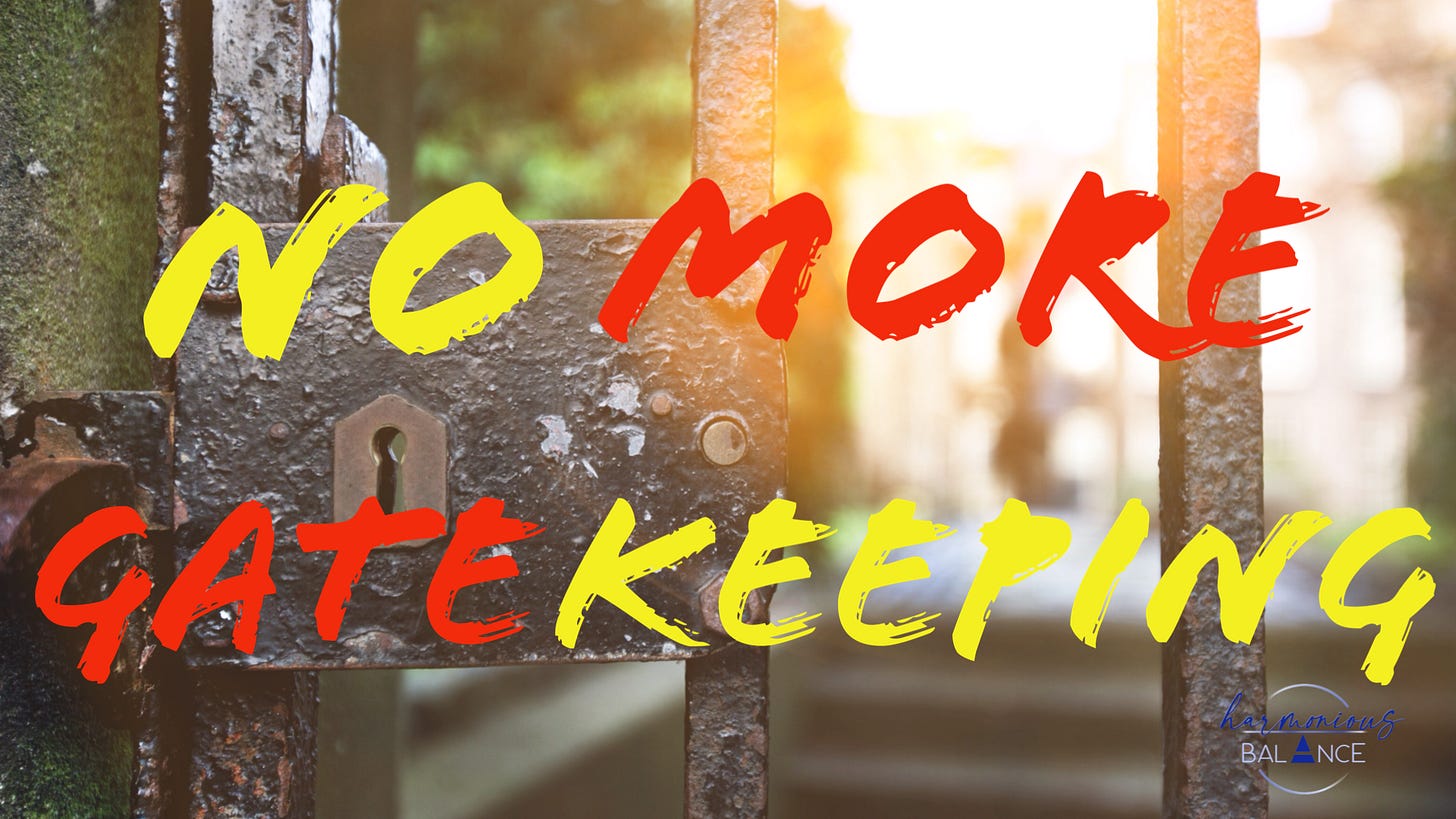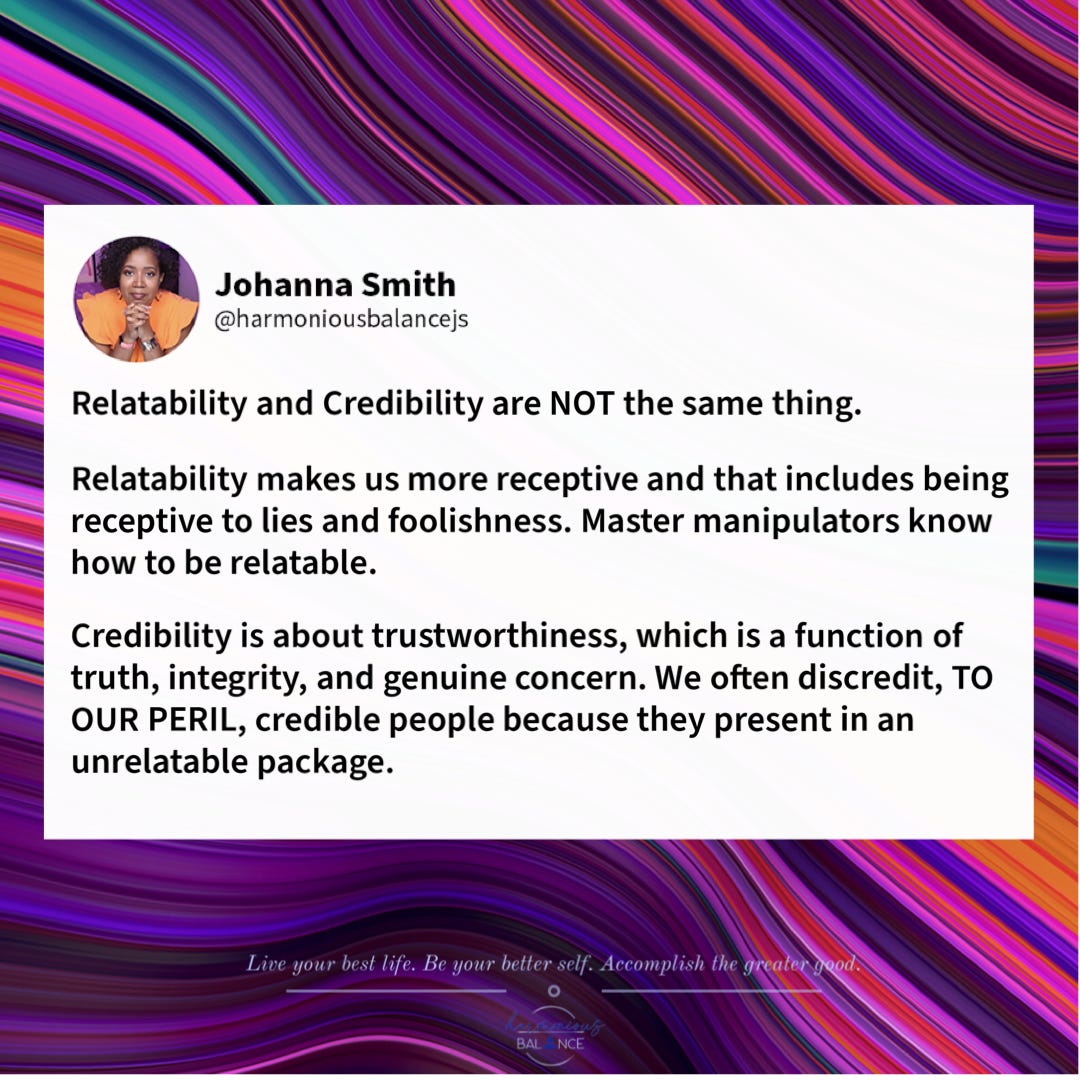Gatekeeping
Why this out of balance discourse inhibits diverse thought instead of protecting it.
To gatekeep is to control access to something, or determine the legitimacy of people’s claims to a particular status, by unilaterally imposing criteria for acceptance. From my experience, people gatekeep to protect their intellectual property and people gatekeep who can and cannot contribute to certain conversations. It is the latter that has me bothered and concerned that we aren’t doing ourselves any favors by gatekeeping. In my opinion, we are doing more harm to our discourse than any good.
Below is a story that I shared with some rising college freshmen. After you read the story, imagine the very first response I received from one of the young ladies in the class.
Once upon a time during my university career coaching days, I sat in on an alumni panel about brand management. One student asked the panel how important it was for brand managers to truly connect with a product or brand? The alumnus happened to be a white male and his response was one that I will never forget. He responded that he was the brand manager for feminine hygiene products line and that he didn't have a personal connection to the product whatsoever but that didn't mean he couldn't manage that brand effectively.
Now take a moment and imagine what the young lady’s immediate comment was.
If you thought she wasn’t too keen on the idea of a man managing the brand of a feminine hygiene product line, you would be CORRECT!! She thought it was absolutely ridiculous. In this moment she was gatekeeping, she thought it was an obvious blunder to not have a woman managing a brand of feminine hygiene products. I’ll circle back to this story in a moment.
My experience with gatekeeping is that it tends to occur across gender and racial lines, though it can occur across any point of difference. In the making of the film Air (the story of how Nike signed Michael Jordan and the making of the iconic Jordan shoe), Ben Affleck credits his wife, Jennifer Lopez, in helping him understand the influence of black culture on style and culture in America. J-Lo of course is not black. She is Latina.
While there was no viral backlash to her insights, not everyone was thrilled for her to speak and be credited as an authority on black culture. Even though I had been following the promotion of Air, as a fan of the 1990s Bulls and Michael Jordan, how I found out about this particular anecdote was because I heard some of the backlash.
I do appreciate why people feel the need to gatekeep. It’s completely understandable because far too often women, underrepresented and marginalized groups suffer as a result of stereotypes, misinformation, disregard, and ignorance. As with all things, however, we tend to misappropriate and overindulge. And as a result gatekeeping becomes less effective, if effective at all.
When it comes to intellectual property, I am more forgiving about gatekeeping. However, gatekeeping in discourse is not always that helpful. Like I said earlier, I tend to notice gatekeeping across racial and gender lines. I hear it across parenting and relationships as well. Parents don’t want to hear from those who are not parents and married people think single people cannot speak intelligently about marriage.
Whatever the point of difference, this zero-sum form of gatekeeping is more harmful to diverse thought than it is to protecting or bolstering diverse thought. Let me explain why I believe it is harmful. The term diversity has been reduced to facets of our identity, namely race and gender (again this applies to any point of difference). One reason for this reduction is diversity becomes easier to measure. Whereas diverse thought is less tangible. Cultural competence is far more difficult to quantify.
Diversity is reduced to compositional diversity because there is an assumption is that having individuals from a range of backgrounds together would bring about the diverse thought needed to solve problems. In my opinion this is one of the possible outcomes of compositional diversity. However one of the more impactful outcomes, in my opinion, is the improvement in cultural competence (intentional emphasis on competence) among those more privileged on any given team. Yes people from different backgrounds can bring diverse points of view. But those points of view are supposed to live on in others and be passed on to others. What do I mean by that?
Let’s go back to J-Lo and Ben Affleck. Jennifer is of Puerto Rican descent and grew up in New York City. In NYC, blacks and Puerto Ricans tend to have a kosher relationship. Puerto Ricans are major players on the hip-hop scene. Jennifer is not unfamiliar to the hip-hop world. Her career got an early big break as a fly girl on the sketch comedy show In Living Color which exemplified black talent and culture. She herself is a fashion trendsetter.
Given her proximity to Ben Affleck, I would find it very odd if she didn’t enlighten him on a few things. Imagine if he made a serious blunder, I’m pretty certain one of the backlash comments would’ve been, he could’ve at least asked his wife! She did not purport to be an authority on black culture but she could provide some helpful insight that could improve his cultural competence.
For the male brand manager example, I can’t speak to him actually being a culturally competent brand manager. He may or may not have been. But it’s not an automatic blunder for him to be in that role. Those of us who have been marginalized have often been made to feel like tokens when we are only expected to speak on matters pertaining to our race and gender. We are insulted because we know we can speak intelligently on other matters. We don’t want to be viewed one-dimensionally. Gatekeeping based on the superficial perpetuates this narrowing.
In closing, I think an honest mistake in all of this is that we conflate relatability and credibility. But they are not synonymous. Believe me when I say I understand where the distrust and skepticism come from. At the same time, I know that shutting people out and shutting people down goes against the cause of inclusion. If someone superficially different chimes in on something seemingly outside of their wheelhouse, I suggest we dig a bit deeper and probe on their actual credibility. If their credibility turns out to be questionable, then we have a case for gatekeeping. Otherwise hyper-focusing on the superficial keeps us in the vicious, unequal, divisive cycle that we all seek to be rid of.
Onward to Harmonious Balance,
Johanna
For customized content requests, inquiries and/or 1:1 coaching, feel free to contact me.







Great content.